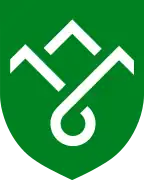Sør-Aurdal
Sør-Aurdal is a municipality in Innlandet county, Norway. It is located in the traditional district of Valdres. The administrative centre of the municipality is the village of Bagn. Other villages in the municipality include Begna, Hedalen, and Begnadalen.[3]
Sør-Aurdal kommune
Søndre Aurdalen herred (historic) | |
|---|---|
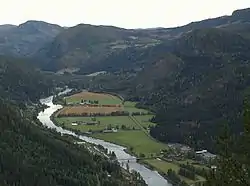 View of Smedlund in Sør-Aurdal | |
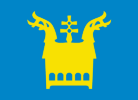 Flag 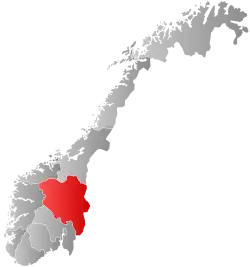 Innlandet within Norway | |
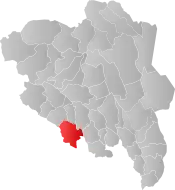 Sør-Aurdal within Innlandet | |
| Coordinates: 60°41′47″N 9°39′32″E | |
| Country | Norway |
| County | Innlandet |
| District | Valdres |
| Established | 1 Jan 1838 |
| • Created as | Formannskapsdistrikt |
| Administrative centre | Bagn |
| Government | |
| • Mayor (2019) | Marit Hougsrud (Sp) |
| Area | |
| • Total | 1,109.05 km2 (428.21 sq mi) |
| • Land | 1,068.24 km2 (412.45 sq mi) |
| • Water | 40.81 km2 (15.76 sq mi) 3.7% |
| • Rank | #101 in Norway |
| Population (2022) | |
| • Total | 2,889 |
| • Rank | #231 in Norway |
| • Density | 2.7/km2 (7/sq mi) |
| • Change (10 years) | |
| Demonym | Søraurdøl[1] |
| Official language | |
| • Norwegian form | Neutral |
| Time zone | UTC+01:00 (CET) |
| • Summer (DST) | UTC+02:00 (CEST) |
| ISO 3166 code | NO-3449 |
| Website | Official website |
The 1,109-square-kilometre (428 sq mi) municipality is the 101st largest by area out of the 356 municipalities in Norway. Sør-Aurdal is the 231st most populous municipality in Norway with a population of 2,889. The municipality's population density is 2.7 inhabitants per square kilometre (7.0/sq mi) and its population has decreased by 8.4% over the previous 10-year period.[4][5]
General information
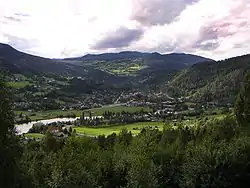
The parish of Søndre Aurdal was established as a municipality on 1 January 1838 (see formannskapsdistrikt law). On 1 January 1894, the new Etnedal Municipality was established by merging the eastern valley area of Nordre Etnedal (population: 362) from the neighboring Nordre Aurdal municipality and the Søndre Etnedal area (population: 1,331) from the neighboring municipality of Søndre Aurdal. Then on 1 January 1984, the unpopulated northern side of the Makalaus mountain was transferred from Sør-Aurdal to Nord-Aurdal.[6][3]
Name
The municipality (originally the parish) is named after the Aurdalen valley (Old Norse: Aurardalr) since it was a central geographic feature of the area. The first word in the name is sør which is essentially a prefix that means "south". The second word comes from the local valley name. The first element of that word is the genitive case of the old river name, Aur, now named Bøaelva. The river name comes from the word aurr which means "gravel". The last element of the second word is dalr which means "valley" or "dale". Originally the municipality was named Søndre Aurdal. In the early 20th century, the name was changed to Sør-Aurdal. Both søndre and sør mean "south" (more specifically, "søndre" means "southern"), so the name Sør-Aurdal means "(the) southern (part of) Aurdal". (The Church of Norway parish of Aurdal that had existed for centuries was divided into two in 1805, just over 30 years before the parish borders were used to defin the new municipality that was established in 1838.)[7]
Coat of arms
The coat of arms was granted by royal decree on 9 February 1990. The official blazon is "Azure, a box reliquary Or" (Norwegian: I blått et gull relikvieskrin). This means the arms have a blue field (background) and the charge is a reliquary. The charge has a tincture of Or which means it is commonly colored yellow, but if it is made out of metal, then gold is used. The arms show the silhouette of a gilt-copper medieval reliquary (chasse). It was designed to look like the one found in the Hedal Stave Church, except that this one has five blue arches which are inspired by the arches on a similar medieval chasse from the nearby medieval St. Thomas Church at Filefjell (now in the Bergen Museum) and representing the five Church of Norway parishes of the municipality (Bagn, Reinli, Hedalen, Bruflat, and Begnadalen). It also has two dragon heads in the design since Sør-Aurdal is one of only two municipalities in Norway that have two stave churches that are still in use. The color blue was chosen to represent the two river systems in the municipality that were historically important for the logging industry and sawmills in Sør-Aurdal. The arms were designed by Arvid Sveen. The municipal flag has the same design as the coat of arms.[8][9][10][11]
Churches
The Church of Norway has five parishes (sokn) within the municipality of Sør-Aurdal. It is part of the Valdres prosti (deanery) in the Diocese of Hamar.
| Parish (sokn) | Church name | Location of the church | Year built |
|---|---|---|---|
| Bagn | Bagn Church | Bagn | 1736 |
| Begnadalen | Begnadalen Church | Begnadalen | 1964 |
| Hedalen | Hedalen Stave Church | Hedalen | c. 1165 |
| Leirskogen | Leirskogen Church | Leirskogen | 1924 |
| Reinli | Reinli Stave Church | Reinli | 1326 |
| Reinli Chapel | Reinli | 1964 |
Geography
Sør-Aurdal municipality is bordered on the north by the municipalities of Nord-Aurdal and Etnedal, on the northeast by Nordre Land, on the east by Søndre Land (all of which are in Innlandet county). It is also bordered on the south by Ringerike and Flå municipalities, and on the west by Nesbyen and Gol municipalities (all of which are in Viken).
Sør-Aurdal is part of the traditional district of Valdres in central, southern Norway, situated between the Gudbrandsdal and Hallingdal valleys. Sør-Aurdal includes parts of several smaller valleys including Begnadalen, Hedalen, Vassfaret, and Vidalen. The river Begna is the main river flowing through the municipality.
History
| Ancestry | Number |
|---|---|
| 28 | |
| 20 | |
| 19 | |
| 17 | |
| 16 |
Reinli Stave Church (built 1190-1250) is the third church on the same location in Reinli. A new tower was added in 1685 and the building was reconditioned by the Society for Preservation of Ancient Buildings in 1885.[13]
Olaf Haraldsson traveled through Valdres in 1023, and also visited Reinli. It is assumed, then, that there was a pagan temple at the same location before the first church, some time before the year 1000.[13]
Hedal Stave Church was built after 1160 and in 1699 it was rebuilt and changed. An old legend says the valley was abandoned during the Black Death and the church later discovered by a bear hunter. A hide is hanging in the church, although now there is only a small part left as visitors have cut away pieces over the years.[13]
Government
All municipalities in Norway are responsible for primary education (through 10th grade), outpatient health services, senior citizen services, welfare and other social services, zoning, economic development, and municipal roads and utilities. The municipality is governed by a municipal council of directly elected representatives. The mayor is indirectly elected by a vote of the municipal council.[14] The municipality falls under the Vestre Innlandet District Court and the Eidsivating Court of Appeal.
Municipal council
The municipal council (Kommunestyre) of Sør-Aurdal is made up of 19 representatives that are elected to four year terms. The party breakdown of the council is as follows:
| Party Name (in Norwegian) | Number of representatives | |
|---|---|---|
| Labour Party (Arbeiderpartiet) | 6 | |
| Progress Party (Fremskrittspartiet) | 1 | |
| Conservative Party (Høyre) | 2 | |
| Centre Party (Senterpartiet) | 9 | |
| Cross-party municipal list (Tverrpolitisk Kommuneliste) | 1 | |
| Total number of members: | 19 | |
| Party Name (in Norwegian) | Number of representatives | |
|---|---|---|
| Labour Party (Arbeiderpartiet) | 6 | |
| Progress Party (Fremskrittspartiet) | 1 | |
| Conservative Party (Høyre) | 2 | |
| Christian Democratic Party (Kristelig Folkeparti) | 2 | |
| Centre Party (Senterpartiet) | 12 | |
| Cross-party municipal list (Tverrpolitisk Kommuneliste) | 2 | |
| Total number of members: | 25 | |
| Party Name (in Norwegian) | Number of representatives | |
|---|---|---|
| Labour Party (Arbeiderpartiet) | 8 | |
| Progress Party (Fremskrittspartiet) | 3 | |
| Conservative Party (Høyre) | 2 | |
| Christian Democratic Party (Kristelig Folkeparti) | 1 | |
| Centre Party (Senterpartiet) | 8 | |
| Cross-party municipal list (Tverrpolitisk Kommuneliste) | 3 | |
| Total number of members: | 25 | |
| Party Name (in Norwegian) | Number of representatives | |
|---|---|---|
| Labour Party (Arbeiderpartiet) | 8 | |
| Progress Party (Fremskrittspartiet) | 4 | |
| Conservative Party (Høyre) | 1 | |
| Christian Democratic Party (Kristelig Folkeparti) | 1 | |
| Centre Party (Senterpartiet) | 8 | |
| Cross-party municipal list (Tverrpolitisk Kommuneliste) | 3 | |
| Total number of members: | 25 | |
| Party Name (in Norwegian) | Number of representatives | |
|---|---|---|
| Labour Party (Arbeiderpartiet) | 10 | |
| Conservative Party (Høyre) | 2 | |
| Christian Democratic Party (Kristelig Folkeparti) | 2 | |
| Centre Party (Senterpartiet) | 5 | |
| Socialist Left Party (Sosialistisk Venstreparti) | 2 | |
| Cross-party municipal list (Tverrpolitisk Kommuneliste) | 4 | |
| Total number of members: | 25 | |
| Party Name (in Norwegian) | Number of representatives | |
|---|---|---|
| Labour Party (Arbeiderpartiet) | 11 | |
| Conservative Party (Høyre) | 3 | |
| Christian Democratic Party (Kristelig Folkeparti) | 2 | |
| Centre Party (Senterpartiet) | 3 | |
| Cross-party municipal list (Tverrpolitisk Kommuneliste) | 6 | |
| Total number of members: | 25 | |
| Party Name (in Norwegian) | Number of representatives | |
|---|---|---|
| Labour Party (Arbeiderpartiet) | 10 | |
| Conservative Party (Høyre) | 3 | |
| Socialist Left Party (Sosialistisk Venstreparti) | 1 | |
| Joint list of the Centre Party (Senterpartiet) and the Christian Democratic Party (Kristelig Folkeparti) | 9 | |
| Cross-party municipal list (Tverrpolitisk Kommuneliste) | 2 | |
| Total number of members: | 25 | |
| Party Name (in Norwegian) | Number of representatives | |
|---|---|---|
| Labour Party (Arbeiderpartiet) | 9 | |
| Christian Democratic Party (Kristelig Folkeparti) | 1 | |
| Socialist Left Party (Sosialistisk Venstreparti) | 2 | |
| Joint list of the Conservative Party (Høyre), Centre Party (Senterpartiet), and Liberal Party (Venstre) | 13 | |
| Total number of members: | 25 | |
| Party Name (in Norwegian) | Number of representatives | |
|---|---|---|
| Labour Party (Arbeiderpartiet) | 13 | |
| Conservative Party (Høyre) | 3 | |
| Christian Democratic Party (Kristelig Folkeparti) | 2 | |
| Centre Party (Senterpartiet) | 6 | |
| Socialist Left Party (Sosialistisk Venstreparti) | 1 | |
| Total number of members: | 25 | |
| Party Name (in Norwegian) | Number of representatives | |
|---|---|---|
| Labour Party (Arbeiderpartiet) | 14 | |
| Conservative Party (Høyre) | 3 | |
| Christian Democratic Party (Kristelig Folkeparti) | 2 | |
| Centre Party (Senterpartiet) | 5 | |
| Liberal Party (Venstre) | 1 | |
| Total number of members: | 25 | |
| Party Name (in Norwegian) | Number of representatives | |
|---|---|---|
| Labour Party (Arbeiderpartiet) | 13 | |
| Conservative Party (Høyre) | 4 | |
| Christian Democratic Party (Kristelig Folkeparti) | 2 | |
| Centre Party (Senterpartiet) | 5 | |
| Liberal Party (Venstre) | 1 | |
| Total number of members: | 25 | |
| Party Name (in Norwegian) | Number of representatives | |
|---|---|---|
| Labour Party (Arbeiderpartiet) | 13 | |
| Conservative Party (Høyre) | 1 | |
| Christian Democratic Party (Kristelig Folkeparti) | 3 | |
| Centre Party (Senterpartiet) | 6 | |
| Socialist Left Party (Sosialistisk Venstreparti) | 1 | |
| Liberal Party (Venstre) | 1 | |
| Total number of members: | 25 | |
| Party Name (in Norwegian) | Number of representatives | |
|---|---|---|
| Labour Party (Arbeiderpartiet) | 14 | |
| Christian Democratic Party (Kristelig Folkeparti) | 2 | |
| Liberal Party (Venstre) | 1 | |
| Joint List(s) of Non-Socialist Parties (Borgerlige Felleslister) | 8 | |
| Total number of members: | 25 | |
| Party Name (in Norwegian) | Number of representatives | |
|---|---|---|
| Labour Party (Arbeiderpartiet) | 15 | |
| Christian Democratic Party (Kristelig Folkeparti) | 1 | |
| Joint List(s) of Non-Socialist Parties (Borgerlige Felleslister) | 9 | |
| Total number of members: | 25 | |
| Party Name (in Norwegian) | Number of representatives | |
|---|---|---|
| Labour Party (Arbeiderpartiet) | 15 | |
| Christian Democratic Party (Kristelig Folkeparti) | 1 | |
| Joint List(s) of Non-Socialist Parties (Borgerlige Felleslister) | 8 | |
| Local List(s) (Lokale lister) | 1 | |
| Total number of members: | 25 | |
| Party Name (in Norwegian) | Number of representatives | |
|---|---|---|
| Labour Party (Arbeiderpartiet) | 14 | |
| Christian Democratic Party (Kristelig Folkeparti) | 2 | |
| Joint List(s) of Non-Socialist Parties (Borgerlige Felleslister) | 8 | |
| Local List(s) (Lokale lister) | 1 | |
| Total number of members: | 25 | |
| Party Name (in Norwegian) | Number of representatives | |
|---|---|---|
| Labour Party (Arbeiderpartiet) | 14 | |
| Christian Democratic Party (Kristelig Folkeparti) | 2 | |
| Joint List(s) of Non-Socialist Parties (Borgerlige Felleslister) | 9 | |
| Total number of members: | 25 | |
| Party Name (in Norwegian) | Number of representatives | |
|---|---|---|
| Labour Party (Arbeiderpartiet) | 18 | |
| Joint List(s) of Non-Socialist Parties (Borgerlige Felleslister) | 14 | |
| Total number of members: | 32 | |
| Party Name (in Norwegian) | Number of representatives | |
|---|---|---|
| Labour Party (Arbeiderpartiet) | 14 | |
| Communist Party (Kommunistiske Parti) | 3 | |
| Farmers' Party (Bondepartiet) | 4 | |
| Joint list of the Liberal Party (Venstre) and the Radical People's Party (Radikale Folkepartiet) | 2 | |
| Joint List(s) of Non-Socialist Parties (Borgerlige Felleslister) | 9 | |
| Total number of members: | 32 | |
| Party Name (in Norwegian) | Number of representatives | |
|---|---|---|
| Labour Party (Arbeiderpartiet) | 13 | |
| Communist Party (Kommunistiske Parti) | 3 | |
| Joint List(s) of Non-Socialist Parties (Borgerlige Felleslister) | 7 | |
| Local List(s) (Lokale lister) | 9 | |
| Total number of members: | 32 | |
| Party Name (in Norwegian) | Number of representatives | |
|---|---|---|
| Labour Party (Arbeiderpartiet) | 14 | |
| Joint List(s) of Non-Socialist Parties (Borgerlige Felleslister) | 14 | |
| Local List(s) (Lokale lister) | 4 | |
| Total number of members: | 32 | |
| Note: Due to the German occupation of Norway during World War II, no elections were held for new municipal councils until after the war ended in 1945. | ||
Mayors
- 1838-1842: Ole Ellingsen Østvold
- 1842-1845: Christoffer Juckam
- 1846-1849: Johan H. Corneliussen
- 1850-1851: Lars K. Kirkeberg
- 1852-1859: Erik Tidemandsen Wold
- 1860-1860: John Nilsen Fjeld
- 1860-1863: Lars K. Kirkeberg
- 1864-1871: Mikkel Sörböen
- 1872-1881: Erling Wold
- 1882-1883: Ole G. Nerbye
- 1884-1891: Erling Wold
- 1892-1893: Ole M. Øvergaard
- 1894-1898: Erling Wold
- 1899-1904: Arne Fönhus, Jr.
- 1905-1907: Erling Wold
- 1908-1913: Ole M. Øvergaard
- 1914-1919: Ole O. Tronrud
- 1920-1925: Arne H. Grøv
- 1926-1927: Kristoffer Eid
- 1928-1931: Eirik Klemmetsrud
- 1932-1940: Arne H. Grøv (V)
- 1941-1944: Kristoffer Eid (NS)
- 1945-1945: Arne H. Grøv (V)
- 1946-1963: Harald Bakken (Ap)
- 1964-1981: Hallgrim Tronrud (Ap)
- 1982-1991: Kristoffer Storruste (Ap)
- 1992-1999: Svein Thorsrud (Sp)
- 1999-2007: Knut Torgersen (Ap)
- 2007–2019: Kåre Helland (Sp)
- 2019–present: Marit Hougsrud (Sp)
Media gallery
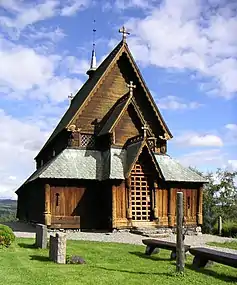 Reinli Stavkyrkje
Reinli Stavkyrkje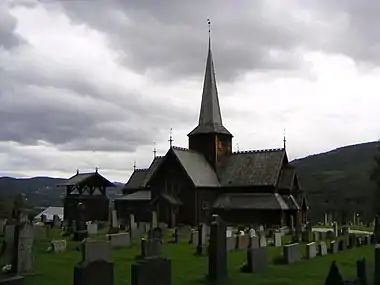 Hedal Stavkyrkje
Hedal Stavkyrkje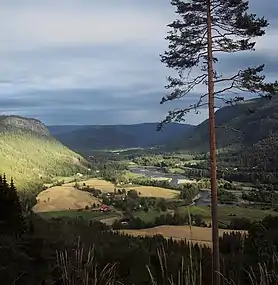 Begnadalen
Begnadalen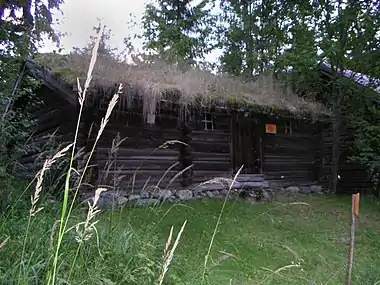 Svartsetera, Bagn Bygdesamling
Svartsetera, Bagn Bygdesamling
Attractions
- Bagn Bygdesamling is a museum that is associated with Valdres Folkemuseum. It is located 8 kilometres (5.0 mi) south of Bagn. It consists of twelve log houses and a building for permanent displays. A part of the museum is at Sandviken and the farm is Bagnsbergatn.
- Bautahaugen Samlinger is another museum that is also associated with Valdres Folkemuseum. It is located in the middle of Hedalen. It consists of a collection of houses and items from Hedalen. The Hedal Stave Church is located just nearby.
Notable residents
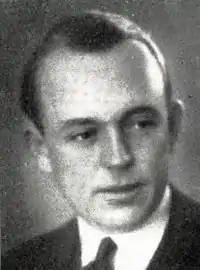
- Ola Hermundsen Berge (1768 in Sør-Aurdal - 1825), a Norwegian folk artist and rose painter
- Hans Jacob Stabel (1769–1836), a priest in Sør-Aurdal from 1806; member of the constitutional assembly at Eidsvoll in 1814
- Haldor Boen (1851 in Sør-Aurdal – 1912), an American congressman from Minnesota
- Mikkjel Fønhus (1874 in Sør-Aurdal - 1973), a journalist, novelist and short story writer about animals in the wilderness
- Sigurd Islandsmoen (1881 in Bagn – 1964), a composer of music for the Church of Norway
- Rolf Andvord (1890 in Sør-Aurdal – 1976), a Norwegian jurist and diplomat
- Per Juvkam (1907 in Sør-Aurdal – 2003), a Lutheran Bishop of Bjørgvin 1961-1977
- Ruth Lagesen (1914 in Bagn – 2005), a Norwegian pianist and conductor
- Morten Bakke (born 1968 in Hedalen), a retired football goalkeeper with over 300 club caps
References
- "Navn på steder og personer: Innbyggjarnamn" (in Norwegian). Språkrådet.
- "Forskrift om målvedtak i kommunar og fylkeskommunar" (in Norwegian). Lovdata.no.
- Thorsnæs, Geir, ed. (4 July 2022). "Sør-Aurdal". Store norske leksikon (in Norwegian). Kunnskapsforlaget. Retrieved 25 September 2022.
- Statistisk sentralbyrå (2022). "Table: 06913: Population 1 January and population changes during the calendar year (M)" (in Norwegian).
- Statistisk sentralbyrå (2022). "09280: Area of land and fresh water (km²) (M)" (in Norwegian).
- Jukvam, Dag (1999). Historisk oversikt over endringer i kommune- og fylkesinndelingen (PDF) (in Norwegian). Statistisk sentralbyrå. ISBN 9788253746845.
- Rygh, Oluf (1902). Norske gaardnavne: Kristians amt (anden halvdel) (in Norwegian) (4-2 ed.). Kristiania, Norge: W. C. Fabritius & sønners bogtrikkeri. p. 221.
- "Civic heraldry of Norway - Norske Kommunevåpen". Heraldry of the World. Retrieved 22 April 2023.
- "Sør-Aurdal, Oppland (Norway)". Flags of the World. Retrieved 22 April 2023.
- "Godkjenning av våpen og flagg". Lovdata.no (in Norwegian). Norges kommunal- og arbeidsdepartementet. 9 February 1990. Retrieved 22 April 2023.
- Bakgrunnshistorien til kommunevåpnet for Sør-Aurdal (in Norwegian). Sør-Aurdal kommune. Retrieved 3 January 2009.
- "Immigrants and Norwegian-born to immigrant parents, by immigration category, country background and percentages of the population". ssb.no. Archived from the original on 2 July 2015. Retrieved 29 June 2015.
- Stagg, Frank Noel (1956). East Norway and its Frontier. George Allen & Unwin, Ltd.
- Hansen, Tore; Vabo, Signy Irene, eds. (20 September 2022). "kommunestyre". Store norske leksikon (in Norwegian). Kunnskapsforlaget. Retrieved 14 October 2022.
- "Tall for Norge: Kommunestyrevalg 2019 - Innlandet". Valg Direktoratet. Retrieved 25 September 2022.
- "Tall for Norge: Kommunestyrevalg 2015 - Oppland". Valg Direktoratet.
- "Table: 04813: Members of the local councils, by party/electoral list at the Municipal Council election (M)" (in Norwegian). Statistics Norway.
- "Tall for Norge: Kommunestyrevalg 2011 - Oppland". Valg Direktoratet.
- Kommunestyrevalget 1999 (PDF) (in Norwegian). Oslo-Kongsvinger, Norge: Statistisk sentralbyrå. 2000. ISBN 8253748531. ISSN 0332-8023.
- Kommunestyrevalget 1995 (PDF) (in Norwegian). Oslo-Kongsvinger, Norge: Statistisk sentralbyrå. 1996. ISBN 8253743351. ISSN 0332-8023.
- Kommunestyrevalget 1991 (PDF) (in Norwegian). Oslo-Kongsvinger, Norge: Statistisk sentralbyrå. 1993. ISBN 8253737939. ISSN 0332-8023.
- Kommunestyrevalget 1987 (PDF) (in Norwegian). Oslo-Kongsvinger, Norge: Statistisk sentralbyrå. 1988. ISBN 8253726325. ISSN 0332-8023.
- Kommunestyrevalget 1983 (PDF) (in Norwegian). Oslo-Kongsvinger, Norge: Statistisk sentralbyrå. 1984. ISBN 8253720378. ISSN 0332-8023.
- Kommunestyrevalget 1979 (PDF) (in Norwegian). Oslo, Norge: Statistisk sentralbyrå. 1979. ISBN 8253710836. ISSN 0332-8023.
- Kommunevalgene 1975 (PDF) (in Norwegian). Oslo, Norge: Statistisk sentralbyrå. 1977. ISBN 8253705646.
- Kommunevalgene 1972 (PDF) (in Norwegian). Vol. I. Oslo, Norge: Statistisk sentralbyrå. 1973. ISBN 8253701144.
- "Kommunevalgene 1967" (PDF) (in Norwegian). Oslo, Norge: Statistisk sentralbyrå. 1967.
- "Kommunevalgene 1963" (PDF) (in Norwegian). Oslo, Norge: Statistisk sentralbyrå. 1964.
- "Kommunevalgene og Ordførervalgene 1959" (PDF) (in Norwegian). Oslo, Norge: Statistisk sentralbyrå. 1960.
- "Kommunevalgene og Ordførervalgene 1955" (PDF) (in Norwegian). Oslo, Norge: Statistisk sentralbyrå. 1957.
- "Kommunevalgene og Ordførervalgene 1951" (PDF) (in Norwegian). Oslo: Statistisk sentralbyrå. 1952.
- "Kommunevalgene og Ordførervalgene 1947" (PDF) (in Norwegian). Oslo: Statistisk sentralbyrå. 1948.
- "Kommunevalgene og Ordførervalgene 1945" (PDF) (in Norwegian). Oslo: Statistisk sentralbyrå. 1947.
- "Kommunevalgene og Ordførervalgene 1937" (PDF) (in Norwegian). Oslo: Statistisk sentralbyrå. 1938.
- Sør-Aurdal kommune 1837-1987 (in Norwegian). Sør-Aurdal kommune. 1987.
External links
- Municipal fact sheet from Statistics Norway (in Norwegian)
 Oppland travel guide from Wikivoyage
Oppland travel guide from Wikivoyage- Map of Sør-Aurdal municipality in Kulturnett.no (in Norwegian)
- Mikkjel Fønhus biography from Dagbladet (in Norwegian)


